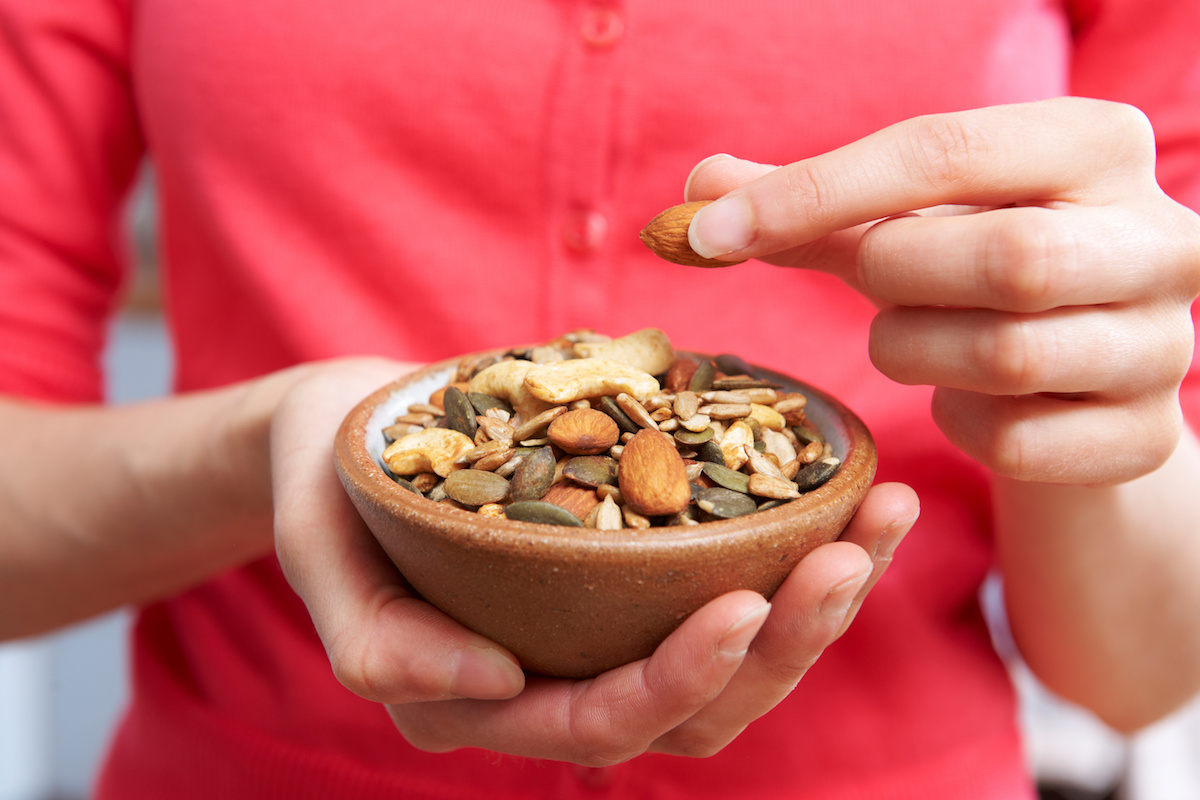Healthy nuts and seeds are an important part of a well-balanced diet. Nuts are the hard shelled “fruit” of certain plants and seeds are a small plant enclosed inside a seed coat. Both are a great source of healthy fats, protein, and fibre – the three main things we need to keep our blood sugar stabilized.
Research also suggests that nuts and seeds can help offset telomere shortening, an indication of cell aging. Telomeres are the protective caps on the ends of your DNA that protect your genetic material. Normally as we age, telomeres shorten, which may cause errors when DNA builds new proteins. Since your DNA generates the proteins and machinery that make your body work effectively, maintaining telomere length throughout your lifespan can keep you biologically young and help prevent age-related diseases.
Certain lifestyle factors have been found to slow down age-related telomere “fraying”. For example, studies have shown that regular exercise can help maintain telomere length, as well as an antioxidant rich diet. A diet full of nuts and seeds is associated with reduced risk of all cause mortality, suggesting that nut and seed consumption might also help preserve telomere length.
In a cross-sectional study, researchers looked at 5,582 men and women between 20-84 years from the National Health and Nutrition Examination survey. Leukocyte telomere length was assessed from blood samples and each participant completed a 24-hour recall dietary assessment to measure nut and seed consumption. The researchers found that while there was a strong, negative correlation between age and telomere length, there was also a positive linear correlation between nut and seed consumption and telomere length. These results suggest that adding more nuts and seeds to your diet can help offset age-related telomere shortening.
This research recommends that one ounce of nuts and seeds per day (1 serving) is enough to offset aging, however more nut and seed consumption was associated with even greater telomere length. Therefore for optimal health, we suggest consuming up to 3 servings per day. One serving is approximately 1 oz, 1/4 cup, or a small palm’s worth of nuts and seeds, or 2 tbsp of nut or seed butter. Some great examples are almonds, walnuts, Brazil nuts, pecans, macadamia nuts, pumpkin seeds, sesame seeds, chia seeds, sunflower seeds, and flax seeds. Here are some ways to incorporate more nuts and seeds into your diet:
- A handful of raw nuts and seeds make a great afternoon snack.
- Add some nuts/seeds to your oats, yogurt, and salads.
- Add nut butters to your morning smoothie or oatmeal.
- Be generous with your nut/seed butters on toast or with some fruit.
- Try this chia pudding recipe: 3 tbsp chia seeds + 1 cup coconut milk + 2 tbsp raw honey + 1/2 tsp cinnamon (let sit overnight and enjoy this on-the-go breakfast)
Enjoy! Let us know if you have a favourite recipe or snack to share.
Author Bio
Greg Wells is the CEO and founder of Wells Performance, a global consulting firm on a mission to elevate how we live our lives at work and in life. He has worked with some of the highest-performing individuals on the planet, including Olympic and world champions and elite organizations including General Electric, BMO, Deloitte, KPMG, BMW, Audi, Sysco Foods, YPO and Air Canada. He is also committed to inspiring children and young adults, working with school boards and independent schools around the world.








